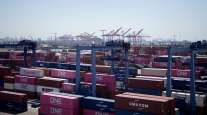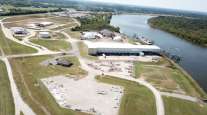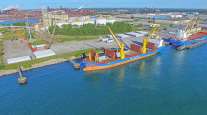Senior Reporter
Port Leaders Seek Reprieve From Permitting Snarls

[Stay on top of transportation news: Get TTNews in your inbox.]
Members of the American Association of Port Authorities say operating conditions now are far different than they were around this time four years ago, when the early days of the COVID-19 pandemic gripped supply chains. But as the group readies for its annual Legislative Summit in Washington, D.C., they note that a new slate of challenges lies ahead as facilities look to expand.
“The Legislative Summit is going to bring in more than 45 port CEOs and their staffs, and it brings in key federal regulators, high-profile members of Congress and industry representatives,” AAPA’s Vice President for Government Relations John Bressler told Transport Topics of the event, set for March 18-21. “We’ve come a long way since March 2020.”
Port leaders are anxious to get a slate of planned expansion projects underway, but stress that lengthy permitting processes are slowing progress and costing port agencies millions of dollars in delays and inflation-related price pressures. With the federal government committing nearly $20 billion over five-plus years to upgrade port facilities along with state and local governments chipping in another estimated $5 billion, AAPA members are anxious for Congress to reduce some of the permitting delays. And steps are being taken.
On March 12, the bipartisan Permitting Optimization for Responsible Transportation Act to streamline permitting and materials regulations for maritime transportation was introduced. Bill sponsors Rep. David Rouzer (R-N.C.) and Rep. Mary Peltola (D-Alaska) touted the bill’s aim to clear a path to build and modernize ports and harbors faster.

Bressler
“Supply chain challenges resulting from the COVID-19 pandemic as well as current disruptions in the Red Sea demonstrate just how critical it is to have reliable and efficient U.S. ports,” Rouzer said. He is also chairman of the House Transportation and Infrastructure Committee’s Subcommittee on Water Resources and Environment. He added, “The PORT Act makes common-sense permitting reforms to help U.S. ports build the infrastructure necessary to keep goods moving and prices down.”
“It should not take longer to permit a federally funded infrastructure project than it does to actually build it,” said AAPA CEO Cary Davis. “Permitting rules and red tape are better for regulatory lawyers than for everyday Americans. The PORT Act would make faster returns on investments in our critical infrastructure, and the industry expresses sincere gratitude to Representatives Peltola and Rouzer for leading this crucial legislation.”
A main stage panel at the summit, scheduled for March 20, will include port leaders from around the country.

Gold
During a February Coast Guard and Maritime Transportation Subcommittee hearing on threats to shipping in the Red Sea caused by the Iranian-backed Houthi rebels, witnesses testified that the U.S. should invest more in its own infrastructure, including ports, to improve its capacity to handle future supply and demand surges caused by external factors.
“The biggest issue right now is to keep making investments on land-side infrastructure, but must work through the operational issues causing congestion issues we saw during the pandemic,” National Retail Federation Vice President Jonathan Gold said at the hearing. “We need to ensure all stakeholders — carriers, terminals, drayage trucks, railroads, warehouse and shippers are all communicating with each other so we have equipment like chassis and railcars readily available when they need to be so we avoid congestion.”
Some of the port projects have been on the drawing board for years, awaiting money that is now coming from the Infrastructure Investment and Jobs Act. Others were in the pipeline before the pandemic, but because of the time required to finish the project — such as the extensive dredging and widening of parts of the 52-mile-long Houston Ship Channel — it is not uncommon for the work to take up to 10 years from the initial proposal to completion.
Federal Maritime Commission Member Carl Bentzel is scheduled to appear at the summit on March 19 with updates on the FMC’s Maritime Transportation Data Initiative that he has spearheaded. In the last year, Bentzel has held 18 public hearings on his proposal to make supply chain information more seamless and transparent, where a shipment can be tracked from the port of origin, across the ocean, then into a port, and onto a railcar or a truck and eventually delivered.
Want more news? Listen to today's daily briefing above or go here for more info
“My intention, after receiving additional feedback from the public, is to identify the key requirements for a reliable maritime transportation system of information. This includes harmonized information sharing; clear standards for understanding container availability, earliest return dates, and other key metrics that arise when cargo is transferred between nodes; and information on fees and charges,” Bentzel said.
He pointed out that during the pandemic, congestion cost the nation trillions in lost economic opportunity and higher prices for consumers, and it was a key factor in rising inflation. “Make no mistake, supply chain congestion is a constant and continuing inefficiency.”




